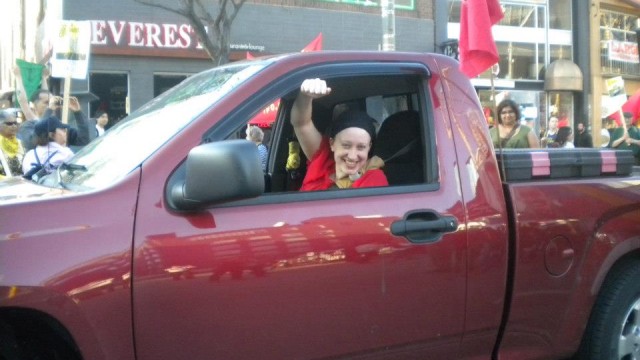by Helena Epinat

Leanne Wilkins, a UFCW member for over 20 years and a paid organizer for the last 6 years, was recently fired by her local’s executive for, she believes, trying to unionize her fellow staffers, among other political reasons.
“The labour movement is broken.” Strong words from long-time union organiser Leanne Wilkins. Wilkins has been part of local 1000A, a local of the United Food and Commercial Workers (UFCW) for over 20 years. Wilkins was fired from her paid position in December 2013 for voicing her displeasure and exposing the hypocrisy of leaders of her local.
Wilkins became a union member in 1993 when she started working at a grocery store part time. In 2008 she was hired by the union. She left her job at the grocery store, and took on the role of a union organizer. As an organizer she helped non-unionized workers, mainly retail workers, form unions.
In mid-November of 2013, she, along with two other colleagues were told they would not receive the wages they were previously promised. When Wilkins was hired as a staff member of the union, she was put on a pay progression scale. Each year, staff members move up a level of pay and after six years a staff member reaches the final level. Wilkins, herself, was six weeks away from moving up to the final level, when she and two other staff members were told they would not receive this increase. After trying to talk to her employers and getting nowhere, Wilkins decide to take action.
At the Ontario Federation of Labour convention in November 2013, Wilkins took to her Facebook wall, stating: “My intention was that if I could get out what they are doing to us and potentially why they are doing this to us, if you put pressure on the outside and on the inside, to our president to change her mind“. Her local president contacted her right away, and asked her to take the Facebook post down. Leanne refused and was fired December 19 2013.
But her Facebook comments amounted to more than griping about a pay raise unfulfilled.
Anti-union sentiments in the union
Leanne felt that her and her colleagues were being unjustly and specifically targeted for prior actions. In 2011 some staff at her local tried to unionize its staff members. At UFCW Local 1000A, staff members are not themselves unionized, despite the staff of other locals under the umbrella of UFCW being unionized. Leanne was part of the group of people within the local who wanted to unionize.
“The staff were basically divided right down the middle,” Leanne told BASICS; and in the end, they were not able to unionize.
The president of her local was part of the group of people who were against the local unionizing. “She made some quite controversial statements, basically chastising those of us who were supportive of unionizing.” This experience left Leanne feeling vulnerable, as she was on the side in favour of unionizing. “Everyone that was really open and supportive now had big giant targets on their back” she explained to BASICS.
The job of a local is not only to work for its members, but also to go out and try and unionize other work places. They encourage workers to unionize by educating them about all the benefits of a union. One of the reasons it can be difficult to organize, is the fear and intimidation that workers receive from management and owners. But these same tactics are being used within a union itself. One questions how they can encourage others to unionize, when they themselves are subjecting their own employees to fear and intimidation.
Targeted for challenging the leadership?
Just a few months after the failed attempt to unionize, there was an internal election to determine the president and executive for local 1000A. In the 70 year history of the local the reigning executive and presidents had always been acclaimed. For the first time, a group of members ran against the current executive. “Needless to say our president did not take that too well.”
In the spring when the election was called, the president gave the staff a letter asking for donations for her campaign. Leanne remained neutral in her support for the executive, and Wilkins claims, she was the only staff member who refused to donate to the current president’s campaign. “I didn’t care at that point. Go ahead try and fire me right? I’ll just bring everything out and say I was fired for political reasons because I didn’t donate. And that contradicts everything that we stand for. Well what we are supposed to stand for in the labour movement – you know, democracy, free speech, all those kinds of things.” In the end, the incumbent president and top executive retained their positions.

Leanne Wilkins is known, among many other things, for her behind-the-scenes contributions to Toronto’s annual May Day rally. A participant in the May 1st Movement, Leanne Wilkins has driven the May Day truck since the founding of the May 1st Movement in Toronto.
Broken Promises
The staff members who were told they would not receive the wages they were promised, were all strong supporters of the group of staff who wanted to unionize the local.
“I feel like we were being [reprimanded] for wanting to unionize at the local, which obviously violates our rights. It completely contradicts the spirit of the labour movement and what it’s suppose to encompass” Wilkins went on to say that “The culture of fear and intimidation in our local that our staff is subjected to, is so deep.“
Wilkins has decided to take legal action and will be suing for wrongful dismissal. She has had to retain a lawyer out of her own pocket. The local on the other hand, has hired a lawyer, who ironically enough is being paid in part through the union dues that Wilkins has paid out for the past 20 years. Essentially her own union dues are being used against her.
BASICS contacted local 1000A to obtain their side of the story. They did not return our calls.
Whither the labour movement?
Wilkins explains that she publicized what was going on in her own local for a specific reason. “It would shine a light on the hypocrisy and contradiction within the labour movement, not only in our local union but the broader labour movement as well. This issue is not exclusive to my local.”
It’s no secret that the labour movement is under attack. General anti-union sentiments are being widely propagated by the media, think tanks and all levels of government. Potential legislation like ‘Right to Work Ontario’ – once promised by Tim Hudak, who back-peddled on it early this year to soften his deeply anti-working class image – would make paying union dues voluntary, are designed to break unions. It goes without saying that the foes and challenges the labour movement face are enormous.
But the labour movement is also being undermined and attacked by those who are supposed to nurture and encourage it. A revitalized labour movement would have to first deal with the internal opportunism and bureaucratism of its leadership and leadership structures if it will be able to tap the energy and power of its members to fight the ongoing and oncoming attacks.
Comments
